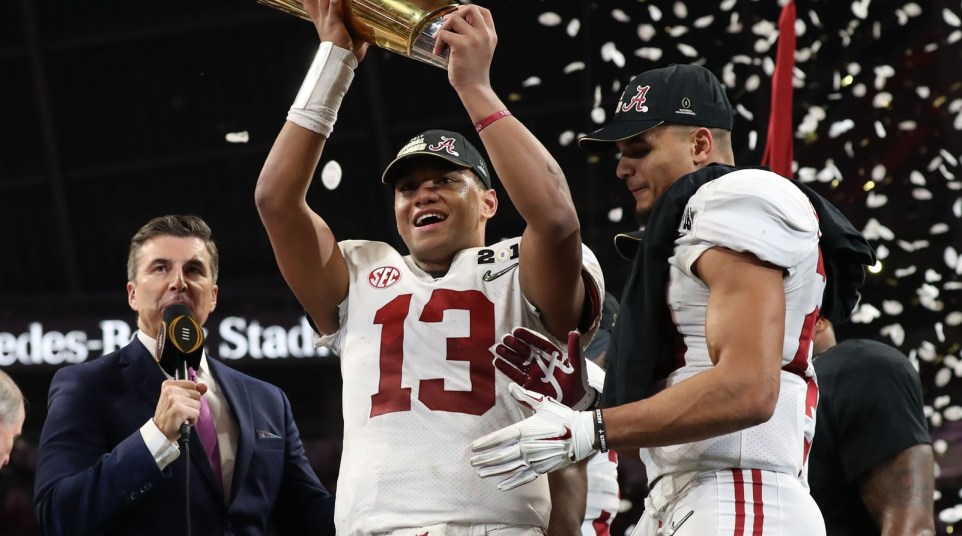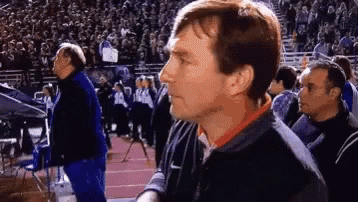
What we learned about college football from the 2017 season
The season is over and my sadness is just beginning.
College football kept us on the edge of our seats the last four months. It filled our Saturdays with don’t-get-off-the-couch entertainment that won’t be matched until fall rolls around again.
I was reminded that 14 straight hours of football is not enough to satisfy my football needs. I learned that long before the 2017 season.
These were the things I actually did learn in 2017:
Age is only a number
Still under the impression that experience matters in college football? OK. That’s cool.
Apparently you missed the true freshmen quarterbacks battling in the national championship. You likely didn’t see the true freshman running back and receiver who fueled Alabama’s comeback effort in the title game. Maybe you missed the true freshman who finished third in FBS in rushing for the Orange Bowl champs. Perhaps you didn’t see that coaches with an average age of 38 with a combined three years of head coaching experience square off in the Rose Bowl.
Youth? Inexperience? We saw in 2017 why those are no longer valid excuses.
Heismans aren’t won in October
So yeah, let’s put these tweets to rest for good…OK?
Saquon Barkley becomes the 1st player in college football history to win the Heisman in October. It's done. Hand it to him. Win or lose here
— Jason McIntyre (@jasonrmcintyre) October 28, 2017
You can have a “Heisman moment” in October, but we learned that November still definitely matters. If it didn’t, Barkley would’ve won the award. Instead, he didn’t get an invite to New York and Baker Mayfield won in a landslide.
And that’s not a dig at Barkley, who was my favorite player to watch in college football the past three years. But when everybody is freaking out about the Heisman in the middle of the season, let’s all remember what we learned in 2017 — it’s a season-long award.
Players can’t breathe on refs, but coaches can push them
Benny Snell and Mark Richt provided us a great example of the double standard that exists in the sport. When Snell refused help up from an official during the middle of the Music City Bowl — after Northwestern players drove him into the ground after the whistle — he was tossed.
Kentucky RB Benny Snell Jr. was ejected for this. What a bleeping joke pic.twitter.com/5M0KV24DGi
— Dustin Schutte (@Schutte_B1GFB) December 29, 2017
When Richt did this during the Orange Bowl, he wasn’t tossed:
Somehow… someway… Mark Richt did NOT get ejected for this pic.twitter.com/hjRkBBEJQU
— 12up (@12upSport) December 31, 2017
We also learned that apparently Richt does apparently have some Miami roots in him after all.
Yes Florida, Nebraska and Tennessee: It could indeed get worse
The three traditional powers had 12 wins this season. Let me clarify that. The three traditional powers combined for 12 wins this season.
Each program followed up nine-win seasons in 2016 with four-win campaigns in 2017. Each program fired its head coach, and each pursued Scott Frost. All three programs sat back while a divisional foe had a historic season at their expense. They would all do anything do have what Georgia and Wisconsin have. They would probably do anything just to have what Iowa and South Carolina had in 2017.
It wasn’t enough that Florida, Nebraska and Tennessee were bad. Each had their own super embarrassing moment in 2017.
Florida’s was suspending 10 players for a credit card scandal before the season even started. Nebraska’s was losing to Northern Illinois at home and firing athletic director Shawn Eichorst days later. And pick your poison with Tennessee. There was the fact that the Vols didn’t win an SEC game in 2017, and there was also the whole sabotaged coaching search that saw a hire fall through because of extreme public reaction.
The crazy thing is that at this time last year, all three programs were hoping to build on nine-win seasons. Now, all they can hope is that rock bottom was 2017. It was, right?
Jimbo Fisher and Dan Mullen weren’t program lifers after all
I’ll be honest. I used to roll my eyes whenever someone told me that Fisher or Mullen would leave their respective programs. Why would Fisher leave Florida State for an SEC job when he didn’t have to face Nick Saban until he got to the College Football Playoff? And why would Mullen, who had zero pressure to win in Starkville, pursue another opportunity when he had a pretty good thing going at Mississippi State?
Well, 2017 showed us that Fisher and Mullen didn’t think like that. Both of them got raises to take on new challenges in the SEC. Fisher’s move might’ve been a bit more lateral, but after the way his relationships reportedly fell apart with the FSU administration, it’s not incredibly surprising that he went to work with an athletic director who he knew and liked. A&M’s pipe dream hire turned out not to be a pipe dream.
And Mullen might not have been Florida’s first choice, but he made more sense than top target Chip Kelly. The question was never really about Florida’s desire to pursue Mullen. It was whether he was willing to leave the program he spent nearly a decade building.
The moves make sense in hindsight, but if you told pre-2017 me about them, I would’ve given you a double eye roll.

Dave Aranda is Nick Saban
Oh, he’s not? LSU just paid Aranda like he’s Saban? Got it.
The new early signing period is actually pretty nice
There were a lot of nervous nellies about the new early signing period. Many thought it would turn the signing period into a complete mess, and that we’d revert back to the old way in 2018.
As it turned out, it was just fine.
Programs got the majority of their classes signed (I haven’t come across one that didn’t), and kids didn’t have to wait an extra six weeks to sign on the dotted line. There weren’t a ton of reports about kids being rushed into a decision, nor where there many stories about verbally committed kids who had offers taken off the table for refusing to sign in December. The timing didn’t disrupt the bowl season like some feared it would.
It’s still an extremely difficult process for new coaches, who have an uphill climb with just three weeks to hire a staff and sign a bunch of recruits — and that’s assuming a coach gets hired immediately after the regular season. But if that’s the biggest downfall from the new system, then the early signing period likely isn’t going anywhere.
February signing day = Blockbuster.
Early Signing Period = Netflix.
Georgia was a sleeping giant that’s now just an awake giant
I had heard people say before 2017 that Georgia was a top-five job in America. I didn’t really believe them. Sure, the Dawgs might have a great fan base and some history with a solid in-state recruiting ground, but it’s hard to be a top-five job without so much as a conference title in over a decade. The eye roll was in full effect.
Well, I’m a believer now.
I actually thought heading into the title game that Georgia had the best season of any program in America. Tua Tagovailoa’s winning touchdown pass for the ages changed that, but it didn’t change the fact that the Dawgs won the SEC and reached their first national championship game in 37 years. On top of that, they’re set to become the first non-Alabama school to sign the No. 1 recruiting class since 2010.

The Dawgs obviously benefited from having four key seniors put their NFL careers on hold, but they had plenty of young talent step up in 2017. Year 2 of the Kirby Smart era was a smashing success, and a reminder that Georgia wasn’t just another solid program holding on to 20th century tradition.
The Dawgs are for real. It seems like only a matter of time before they end that title drought.
Nick Saban has some big, um, guts
I’ve said it before and I’ll say it again. It’s one thing for an Alabama fan to sit at home on their couch and say that a new quarterback needs to come in. It’s another for Saban, the guy with five national titles, to bench the 25-2 quarterback in favor of the true freshman without a meaningful snap in his career. The backlash that Saban would face if a decision like that went wrong would’ve followed him until he won another title.
Saban putting in Tagovailoa was the stuff of legend. It was the single greatest (and riskiest) in-game decision of Saban’s career. Period.
WHAT. A. GAME.
Tua Tagovailoa to DeVonta Smith … BALLGAME!!!@AlabamaFTBL WINS THE NATIONAL CHAMPIONSHIP!!!! pic.twitter.com/WxmHdRazCQ
— SEC Network (@SECNetwork) January 9, 2018
Obviously people like Scott Frost and others are going to say that Saban should’ve been playing Tagovailoa earlier. We saw why throughout the second half and overtime. But it still says so much about Saban that he made that decision in the heat of the moment, and that he didn’t switch back to Jalen Hurts when Tagovailoa went three and out on his first possession.
Nothing about Alabama’s decade of dominance suggested that Saban was a “risk taker.” He simply signed the top recruiting class year after year, coached up his defense, found the right offensive coordinator and won titles. It’s a process that every program in America wishes it could replicate. It’s supposed to mitigate risk as much as possible.
What Saban did on Monday night was not part of the process. He rolled the dice and came up double sevens. Saban’s sixth ring will always be special for that reason. It added a new chapter to what clearly has been the most impressive program of the 21st century.
There. That’s enough rat poison to last Alabama through the offseason.
